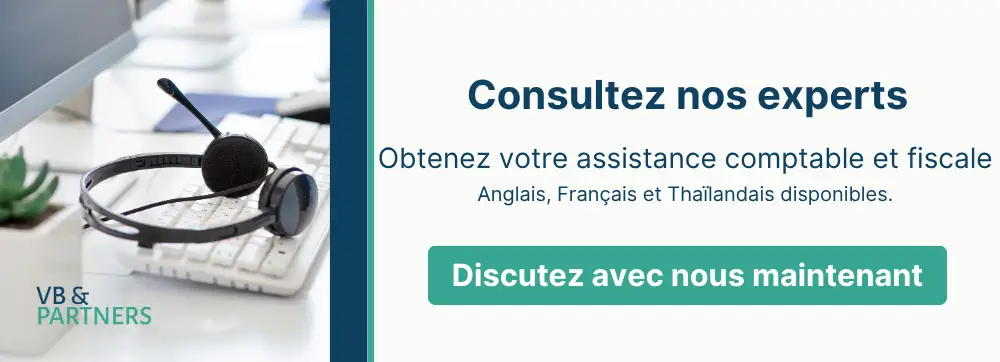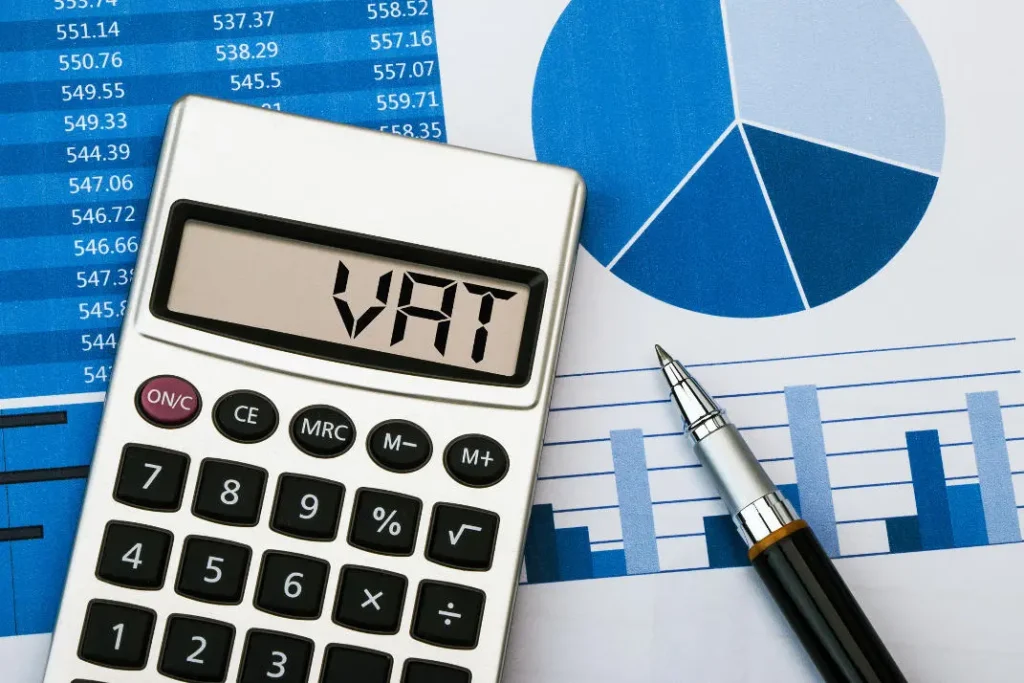Résumé : Changer de cabinet comptable en Thaïlande peut améliorer la gestion financière et la conformité de votre entreprise. Ce changement s’impose souvent en cas de mauvaise communication, de manque d’expertise fiscale ou de soutien limité. Le moment idéal est le début d’un nouvel exercice fiscal, bien qu’un remplacement immédiat soit possible en cas de problème. Une transition réussie repose sur la préparation des documents financiers, la coordination entre les cabinets et la mise à jour des accès. Un bon conseiller comptable garantit fiabilité, qualité de service et efficacité à long terme.
Introduction
Changer de cabinet comptable en Thaïlande est une décision importante pour les entreprises en Thaïlande, car elle peut s’accompagner de défis tels que la recherche d’un nouveau prestataire fiable et la gestion de la transition.
Certaines entreprises estiment que leur cabinet actuel n’est plus adapté en raison de problèmes de communication, d’un manque d’expertise sectorielle ou d’une offre de services limitée. Dans ces situations, opter pour un cabinet de comptabilité mieux adapté peut constituer une étape clé pour renforcer la conformité, la performance et la stabilité de l’entreprise.
Dans cet article, nous examinerons les principales raisons qui poussent les entreprises en Thaïlande à changer de cabinet comptable, le moment le plus approprié pour le faire, ainsi que les étapes essentielles pour assurer une transition fluide et réussie.
Points clés
- Les entreprises choisissent souvent de changer de cabinet comptable en raison d’un manque d’expertise sectorielle, d’une offre de services limitée, d’une communication insuffisante ou d’un accès restreint à leurs données financières.
- Le moment idéal pour effectuer ce changement est le début d’un nouvel exercice fiscal, bien qu’un remplacement immédiat soit possible si le cabinet actuel présente des problèmes majeurs ou compromet la conformité de l’entreprise.
- Le processus de transition dure généralement de quelques jours à deux semaines, la plupart des cabinets exigeant un préavis d’environ un mois avant le changement.
- Les documents essentiels à fournir comprennent la balance de vérification, le grand livre général, les états financiers, les déclarations fiscales et les registres de paie.
- Après le changement de cabinet, les entreprises doivent mettre à jour tous les mots de passe liés aux déclarations fiscales, aux états financiers, à la Sécurité sociale et aux systèmes comptables afin d’assurer la confidentialité et la sécurité des données.
Dans quels cas une PME en Thaïlande devrait-elle envisager de changer de cabinet comptable ?
Une PME en Thaïlande peut envisager de changer de cabinet comptable pour plusieurs raisons essentielles. Trouver un cabinet réellement adapté à ses besoins peut être complexe, surtout pour les entreprises étrangères. Beaucoup de PME font d’abord leur choix sur la base d’informations limitées comme des avis en ligne ou des recommandations avant de réaliser que le niveau de service ou d’expertise ne correspond pas pleinement à leurs attentes.
Voici quelques exemples des principales raisons pour lesquelles une PME peut décider de changer de cabinet comptable :
Une mauvaise communication et une barrière linguistique
De nombreux entrepreneurs étrangers en Thaïlande rencontrent des difficultés avec des comptables peu réactifs, qui répondent lentement aux e-mails ou messages, manquent de proactivité et n’offrent des conseils que sur demande. L’absence de suivi sur les questions fiscales et de conformité peut également entraîner des erreurs, des retards et, dans certains cas, des amendes.
Lorsqu’ils envisagent de changer de cabinet comptable, les chefs d’entreprise étrangers doivent évaluer la qualité de la communication et la réactivité du cabinet. Par exemple, est-ce que le seul mode de contact est l’e-mail, ou le cabinet propose-t-il des plateformes de messagerie instantanée comme LINE ou WhatsApp pour obtenir des réponses plus rapides et efficaces ?
En tant que chef d’entreprise, il est essentiel de collaborer avec un cabinet comptable offrant une communication claire et facilement accessible. De nombreuses entreprises étrangères se plaignent de la difficulté à joindre leur comptable attitré, qui répond souvent lentement, voire pas du tout, à leurs questions. En Thaïlande, il est fréquent que certains comptables ne répondent aux demandes qu’à des moments précis, par exemple uniquement lorsqu’ils préparent les déclarations mensuelles et ont besoin d’informations supplémentaires.
En tant que chef d’entreprise, vous pouvez avoir des questions sur les factures, et vos fournisseurs ou clients peuvent demander des documents ou des informations spécifiques sur votre société. Si votre comptable n’est pas réactif et tarde à répondre, cela peut rapidement causer des retards et générer des complications.
Lire aussi : Comment émettre une facture ou un reçu fiscal en Thaïlande ?
La barrière linguistique
Les barrières linguistiques ou l’absence de personnel maîtrisant l’anglais représentent un facteur clé pour les entreprises, car elles peuvent entraîner malentendus et erreurs. Plus important encore, cela peut empêcher les investisseurs étrangers de saisir des opportunités d’optimisation, faute d’informations compréhensibles ou accessibles.
Les compétences linguistiques sont particulièrement importantes pour les entreprises engagées dans de nombreuses transactions internationales ou faisant partie d’un groupe international, notamment lorsqu’elles doivent gérer les prix de transfert. Un comptable thaïlandais doit maîtriser les réglementations locales et internationales sur les prix de transfert et être capable de communiquer efficacement avec des comptables et des entreprises à l’étranger pour assurer une comptabilité correcte de toutes les transactions concernées.
Lire plus :
Réglementation des prix de transfert en Thaïlande
Manque de conseils ou d’assistance proactive
Une plainte fréquente concernant les comptables en Thaïlande est qu’ils se limitent souvent à la conformité et à la comptabilité de base. Or, de nombreux chefs d’entreprise, en particulier étrangers, ont besoin d’un accompagnement plus complet, incluant par exemple l’optimisation fiscale ou des stratégies pour rendre les déclarations plus efficaces. Il est donc recommandé de choisir un cabinet de comptabilité qui propose des services de conseil. Idéalement, votre comptable devrait consacrer un temps minimal chaque mois à des conseils personnalisés et rester disponible pour répondre à vos questions et demandes d’information courantes.
Il est donc recommandé de choisir un cabinet de comptabilité qui propose des services de conseil. Idéalement, votre comptable devrait consacrer un temps minimal chaque mois à des conseils personnalisés et rester disponible pour répondre à vos questions et demandes d’information courantes.
Manque d’expertise spécifique au secteur d’activité
Un cabinet de comptabilité dépourvu d’expérience dans le secteur d’activité d’un client risque de ne pas fournir de conseils précis ou adaptés et de ne pas maîtriser les réglementations propres à ce secteur. Collaborer avec un comptable qui comprend votre domaine et les particularités de vos opérations permet d’obtenir des recommandations plus pertinentes et fiables. Cela est particulièrement important pour les entreprises soumises à des exigences comptables et fiscales spécifiques. Voici quelques exemples courants :
- Les entreprises soutenues par le BOI ont besoin de comptables qui comprennent comment gérer les exonérations fiscales et se conformer aux règles de déclaration du BOI.
- Les entreprises ayant des clients internationaux peuvent être soumises à des exigences complexes en matière de TVA et de retenue à la source.
- Les fabricants ou les usines doivent gérer correctement leurs stocks dans leurs systèmes comptables.
- Les restaurants et les commerces de détail traitent souvent des transactions à volume élevé et à faible valeur qui nécessitent des pratiques comptables efficaces.
Lire plus :
Comment choisir votre cabinet comptable en Thaïlande

Quand faut-il changer de cabinet de comptabilité ?
Le moment idéal pour changer de cabinet comptable est le début d’un nouvel exercice fiscal, généralement le 1er janvier pour la plupart des entreprises en Thaïlande. Ce timing permet à l’ancien cabinet de clôturer correctement l’exercice précédent et offre au nouveau cabinet un départ clair pour la nouvelle année.
Cependant, si votre prestataire actuel ne répond pas à vos attentes ou manque de compétence, il est conseillé d’effectuer le changement immédiatement. Dans ce cas, il est essentiel de vérifier le contrat en cours afin de connaître les conditions et obligations liées à la résiliation.
Étant donné que les entreprises en Thaïlande doivent effectuer des clôtures mensuelles pour la TVA, les déclarations fiscales et les salaires, le moment le plus pratique pour changer de comptable en cours d’année est à la fin d’un mois civil. Cela permet au nouveau cabinet de prendre le relais dès le mois suivant.
Si le changement intervient avant la fin de l’exercice fiscal, il est essentiel de gérer la transition avec soin, l’ancien comptable ayant accès à des informations financières sensibles. Il est donc fortement recommandé de maintenir une relation professionnelle tout au long de cette période.
Enfin, les chefs d’entreprise doivent s’assurer que toutes les données financières pertinentes, l’accès aux logiciels de comptabilité (le cas échéant) et les identifiants de connexion aux systèmes sont correctement transmis au nouveau prestataire.
Comment changer de cabinet comptable
Une fois la décision de changer de cabinet comptable prise, la transition peut sembler complexe, mais le processus est généralement simple.
Le nouveau cabinet se charge normalement du transfert et coordonne avec l’ancien prestataire la collecte de toutes les informations et documents nécessaires. Il est toutefois recommandé de vérifier votre contrat de service pour confirmer cette procédure.
En Thaïlande, la plupart des cabinets exigent un préavis d’un mois avant de lancer le processus d’intégration avec le nouveau prestataire. Une fois ce préavis respecté, le nouveau comptable peut prendre le relais dès le mois suivant.
Le processus d’intégration avec votre nouveau cabinet comptable devrait durer environ un mois, bien que sa durée réelle dépende de la complexité de votre entreprise, du volume de transactions et de l’état actuel de votre comptabilité et de vos déclarations fiscales.
Un cabinet comptable professionnel doit être capable de gérer l’ensemble de la transition tout en perturbant le moins possible vos activités commerciales.
Avant de procéder au changement, assurez-vous d’avoir évalué les besoins de votre entreprise et vérifié que le nouveau cabinet peut fournir l’ensemble des services requis,
notamment :
- la comptabilité,
- la conformité fiscale,
- les rapports financiers,
- le conseil aux entreprises.
Quels documents sont requis auprès de l’ancien cabinet comptable lors d’un changement de prestataire ?
Lors du passage à un nouveau cabinet comptable, l’étape la plus longue et parfois la plus complexe consiste souvent à rassembler les documents nécessaires auprès de l’ancien prestataire. Un problème fréquent pouvant provoquer des retards est la lenteur de l’ancien cabinet à fournir ces documents, notamment si vous n’êtes plus un client actif et ne faites donc plus partie de leurs priorités.
Les documents suivants seront requis lors du passage à un nouveau cabinet :
Rapports d'inventaire : registres détaillés des niveaux de stocks et des évaluations.
Balance de vérification : résumé de tous les soldes du grand livre afin de s'assurer que les crédits et les débits sont équilibrés.
Grand livre : registre complet de toutes les transactions financières.
États financiers : rapports complets détaillant les activités financières de votre entreprise.
Plan comptable : liste de tous les comptes utilisés dans le système comptable de votre entreprise.
Rapprochements bancaires : documents rapprochant les relevés bancaires et les registres financiers de votre entreprise.
Déclarations fiscales : copies de toutes les déclarations fiscales déposées.
Registres de paie : registres détaillés de la rémunération des employés et des déclarations fiscales correspondantes.
Rapports sur les comptes débiteurs et créditeurs : listes des factures clients en souffrance et des factures fournisseurs impayées.
Registre des immobilisations : registre de toutes les immobilisations détenues par votre entreprise.
Autres considérations lors d’un changement de cabinet comptable
Une fois le transfert et l’intégration au nouveau cabinet comptable achevé, il est essentiel de mettre à jour tous les mots de passe qui avaient été communiqués à l’ancien cabinet. Cette précaution permet d’empêcher tout accès accidentel ou non autorisé à vos informations confidentielles.
Les mots de passe importants à modifier sont les suivants :
- les systèmes de déclaration fiscale auprès du département du Revenu,
- les systèmes de dépôt des états financiers auprès du ministère du Développement des entreprises,
- les systèmes de déclaration de Sécurité sociale et
- tous les systèmes comptables de l'entreprise utilisés en collaboration en ligne.
Nos réflexions
Choisir un expert-comptable en Thaïlande compétent, notamment à Bangkok, est essentiel pour garantir la conformité fiscale et bénéficier de conseils en optimisation fiscale. Un bon comptable ne se limite pas à la tenue de la comptabilité et à la préparation des déclarations fiscales. Il doit maîtriser les exigences spécifiques de votre secteur, vous accompagner sur les questions de conformité, proposer des stratégies d’optimisation fiscale et fournir des services de conseil adaptés.
Tous les cabinets comptables ne peuvent cependant pas offrir l’ensemble de ces services, et un changement peut parfois s’avérer nécessaire. Lorsqu’un cabinet adapté est identifié, il est essentiel de veiller à ce que la transition et l’intégration se déroulent de manière fluide et efficace, afin d’éviter tout retard ou problème inutile pour l’entreprise.
Clause de non-responsabilité
Veuillez noter que cet article est fourni à titre d'information uniquement et ne constitue pas un conseil juridique ou fiscal.





